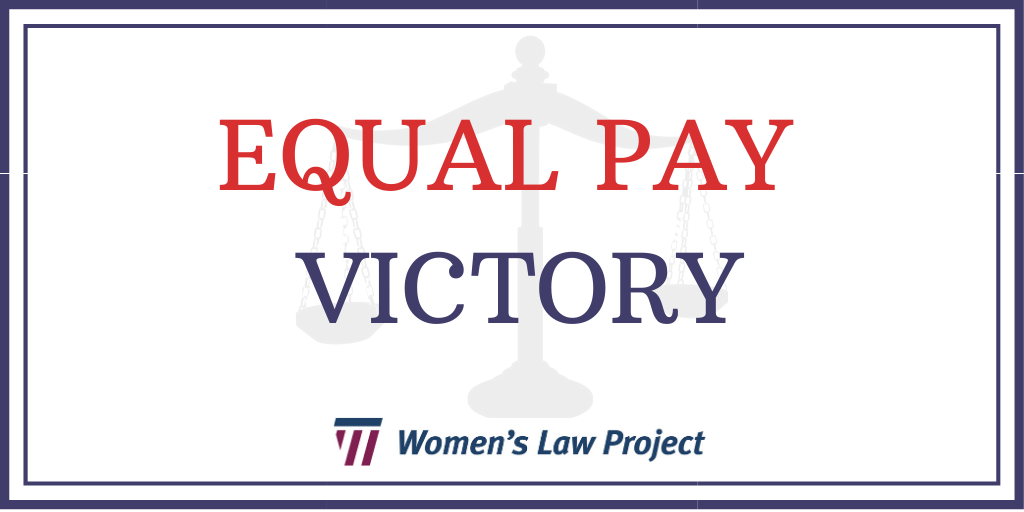
After a years-long court battle, the United States Court of Appeals for the Third Circuit issued a precedential opinion upholding the legality of a ban on inquiries about a job applicant’s prior pay to set future pay.
“This is a victory for workers who have been or are at risk of being denied equal pay based on bias and unable to escape it due to employers basing wages on discriminatory prior pay rather than a job’s responsibilities and the applicant’s experience,” said Terry L. Fromson, managing attorney at the Women’s Law Project and Pennsylvania representative for the nationwide Equal Pay Today! Campaign.
Fromson testified in support of the legislation before City Council and co-authored an amicus (“friend of the court”) brief defending the legality of the City’s ordinance before the Third Circuit with WLP colleague Amal Bass and University of Colorado Law School Professor Helen Norton. The brief was filed on behalf of the Women’s Law Project and 36 organizations dedicated to wage equity which addressed the impact of prior pay inquiries and reliance on the wages of women and people of color.
Fromson’s testimony is cited throughout today’s opinion.
“This victory is also a tribute to Philadelphia’s leaders, including former City Council member William Greenlee and Philadelphia Mayor Jim Kenney, for their consistent dedication to eradicating pay discrimination,” says Fromson.
Today, the U.S. Court of Appeals for the Third Circuit determined that the prior pay inquiry ban was likely to be constitutional and sent the case back with instruction to the District Court to reverse the preliminary injunction on the inquiry prong as wrongly decided.
The legal battle is not over. But the Third Circuit has decided that the ordinance is properly supported by the record, which bodes well for the ordinance as the litigation proceeds at the trial level.
“This precedential opinion recognizes and highlights the important role local legislatures play in addressing the problems their citizens face by passing commonsense solutions,” says WLP attorney Amal Bass. “Congratulations to the City of Philadelphia for defending its ability to be, in Justice Louis Brandeis’s words, a ‘laboratory of democracy.’”
Case Background
Philadelphia’s prior wage equal pay ordinance was initially passed by City Council in December 2016.
The ordinance prohibits employers from relying on prior wages to determine pay and additionally prohibits inquiries about wage information that can be used to pay women and people of color less than white men for the same work. It is necessary because existing non-discrimination laws have not succeeded in eliminating the persistent wage gap that harms women and people of color.
It was scheduled to go into effect on May 23, 2017, but stalled when the Greater Philadelphia Chamber of Commerce, supported by thirteen local businesses, filed a lawsuit to block it, alleging the ordinance violated their First Amendment rights.
In May 2018, the U.S. District Court for the Eastern District of Pennsylvania issued a split decision that granted the Chamber’s motion seeking a preliminary injunction on the provision prohibiting employers asking job applicants their prior wages, but denied the Chamber’s request for a preliminary injunction on the part of the ordinance that prohibits relying on it.
Both sides appealed.
Businesses Seeking to Block Philadelphia’s Equal Pay Ordinance
Thirteen local businesses are identified in the lawsuit as fighting the implementation of the equal pay ordinance. They are Bittenbender Construction, Comcast Corp., Children’s Hospital of Philadelphia, Liberty Property Trust, DocuVault Delaware Valley LLC, Drexel University, Jacobson Strategic Communications, FS Investments, Sandmeyer Steel Company, Diversified Search, Chamber of Commerce for Greater Philadelphia, ESM Productions, and Day & Zimmermann.
Thank You to the Organizations that Signed on to the Brief
The Women’s Law Project would like to thank the civil rights and non-profit organizations that signed on to this brief in support of Philadelphia’s prior wage equal pay ordinance including A Better Balance: The Work and Family Legal Center; American Association of University Women; The American Civil Liberties Union; Atlanta Women for Equality; The California Women’s Law Center; The Coalition of Labor Union Women; Community Legal Services; Equal Pay Today; Equal Rights Advocates; Family Values @ Work; Gender Justice; Hadassah; The Institute for Women’s Policy Research; The Keystone Research Center; Legal Aid at Work; Legal Momentum; Legal Voice; The National Asian Pacific American Women’s Forum; The National Center for Law and Economic Justice; The National Council of Jewish Women; The National Council of Jewish Women; The National Employment Law Project; The National Organization for Women; The National Partnership for Women & Families; The National Women’s Law Center; The Pennsylvania Coalition Against Rape; PathWays PA; Restaurant Opportunities Center of Pennsylvania; Southwest Women’s Law Center, The Union for Reform Judaism; Women and Girls Foundation of Southwestern Pennsylvania; Women Employed; and Women of Reform Judaism.
The Women’s Law Project is a public interest law center devoted to defending and expanding the rights of women, girls, and LGBTQ people in Pennsylvania and beyond.
Sign up for WLP’s Action Alerts. Stay up to date on issues and policy by following us on twitter liking us on Facebook and following us on Instagram.
We are a non-profit organization. Please consider supporting equal rights for women and girls by making a one-time donation or scheduling a monthly contribution.


